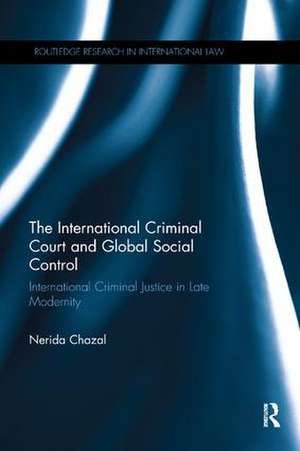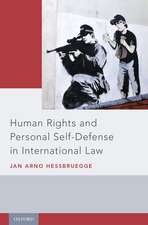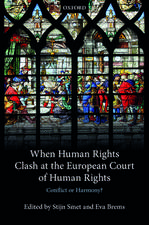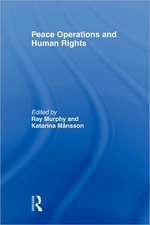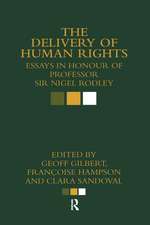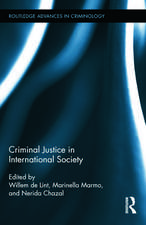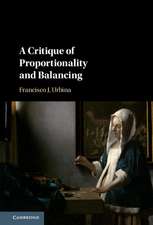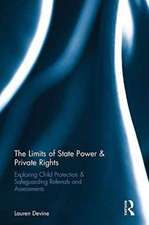The International Criminal Court and Global Social Control: International Criminal Justice in Late Modernity: Routledge Research in International Law
Autor Nerida Chazalen Limba Engleză Paperback – iun 2018
This book explores the gaps, schisms, and contradictions that are increasingly defining the International Criminal Court, moving beyond existing legal, international relations, and political accounts of the ICC to analyse the Court from a criminological standpoint. By exploring the way different actors engage with the ICC and viewing the Court through the framework of late modernity, the book considers how gaps between rhetoric and reality arise in the work of the ICC. Contrary to much existing research, the book examines how such gaps and tensions can be productive as they enable the Court to navigate a complex, international environment driven by geopolitics.
The International Criminal Court and Global Social Control will be of interest to academics, researchers, and advanced practitioners in international law, international relations, criminology, and political science. It will also be of use in upper-level undergraduate and postgraduate courses related to international criminal justice and globalization.
| Toate formatele și edițiile | Preț | Express |
|---|---|---|
| Paperback (1) | 408.16 lei 6-8 săpt. | |
| Taylor & Francis – iun 2018 | 408.16 lei 6-8 săpt. | |
| Hardback (1) | 1052.38 lei 6-8 săpt. | |
| Taylor & Francis – 26 noi 2015 | 1052.38 lei 6-8 săpt. |
Din seria Routledge Research in International Law
-
 Preț: 296.42 lei
Preț: 296.42 lei -
 Preț: 311.70 lei
Preț: 311.70 lei -
 Preț: 151.71 lei
Preț: 151.71 lei -
 Preț: 311.94 lei
Preț: 311.94 lei -
 Preț: 281.27 lei
Preț: 281.27 lei - 18%
 Preț: 1053.16 lei
Preț: 1053.16 lei -
 Preț: 484.47 lei
Preț: 484.47 lei -
 Preț: 282.62 lei
Preț: 282.62 lei -
 Preț: 410.46 lei
Preț: 410.46 lei - 18%
 Preț: 1060.52 lei
Preț: 1060.52 lei - 18%
 Preț: 1058.43 lei
Preț: 1058.43 lei -
 Preț: 452.27 lei
Preț: 452.27 lei - 18%
 Preț: 1054.75 lei
Preț: 1054.75 lei - 18%
 Preț: 727.38 lei
Preț: 727.38 lei -
 Preț: 422.04 lei
Preț: 422.04 lei - 18%
 Preț: 1054.71 lei
Preț: 1054.71 lei - 18%
 Preț: 1059.48 lei
Preț: 1059.48 lei - 18%
 Preț: 1074.44 lei
Preț: 1074.44 lei -
 Preț: 451.41 lei
Preț: 451.41 lei -
 Preț: 419.11 lei
Preț: 419.11 lei - 28%
 Preț: 822.34 lei
Preț: 822.34 lei -
 Preț: 494.07 lei
Preț: 494.07 lei - 18%
 Preț: 1117.88 lei
Preț: 1117.88 lei - 18%
 Preț: 1118.46 lei
Preț: 1118.46 lei -
 Preț: 491.60 lei
Preț: 491.60 lei -
 Preț: 490.25 lei
Preț: 490.25 lei - 18%
 Preț: 1178.15 lei
Preț: 1178.15 lei -
 Preț: 444.62 lei
Preț: 444.62 lei - 18%
 Preț: 1050.78 lei
Preț: 1050.78 lei -
 Preț: 454.22 lei
Preț: 454.22 lei - 14%
 Preț: 301.05 lei
Preț: 301.05 lei -
 Preț: 419.32 lei
Preț: 419.32 lei - 18%
 Preț: 1052.38 lei
Preț: 1052.38 lei - 18%
 Preț: 1111.87 lei
Preț: 1111.87 lei - 18%
 Preț: 1112.34 lei
Preț: 1112.34 lei - 15%
 Preț: 550.99 lei
Preț: 550.99 lei - 18%
 Preț: 1054.71 lei
Preț: 1054.71 lei -
 Preț: 422.91 lei
Preț: 422.91 lei -
 Preț: 286.51 lei
Preț: 286.51 lei - 18%
 Preț: 1065.06 lei
Preț: 1065.06 lei
Preț: 408.16 lei
Nou
Puncte Express: 612
Preț estimativ în valută:
78.10€ • 81.54$ • 64.64£
78.10€ • 81.54$ • 64.64£
Carte tipărită la comandă
Livrare economică 04-18 aprilie
Preluare comenzi: 021 569.72.76
Specificații
ISBN-13: 9781138614598
ISBN-10: 1138614599
Pagini: 174
Dimensiuni: 156 x 234 x 10 mm
Greutate: 0.26 kg
Ediția:1
Editura: Taylor & Francis
Colecția Routledge
Seria Routledge Research in International Law
Locul publicării:Oxford, United Kingdom
ISBN-10: 1138614599
Pagini: 174
Dimensiuni: 156 x 234 x 10 mm
Greutate: 0.26 kg
Ediția:1
Editura: Taylor & Francis
Colecția Routledge
Seria Routledge Research in International Law
Locul publicării:Oxford, United Kingdom
Public țintă
Postgraduate, Professional, and UndergraduateCuprins
1. Introduction 2. The Development and Aims of the International Criminal Court 3. Tensions between Ideal and Reality in the Pursuit of Justice 4. Late Modernity, Social Control and the ICC 5. The Role of Actors in Shaping the ICC 6. The Trial as a Site of Contest: The DRC and Thomas Lubanga 7. The ICC as a Tool 8. Conclusion: The Resilience of the ICC and International Criminal Justice in Late Modernity
Recenzii
"At its genesis, the International Criminal Court was expected to help prevent atrocities by ending the impunity of leaders and administering punishment for the commission of international crimes. More than a decade later, the ICC’s ability to achieve these broad aims has been questioned, as the ICC has reached only two guilty verdicts, and the United States, Russia, and China have not joined. Chazal considers how gaps between rhetoric and reality arise in
the work of the ICC, and concludes that these can be productive as they enable the Court to navigate a complex, international environment driven by geopolitics."
Law and Social Inquiry Journal
the work of the ICC, and concludes that these can be productive as they enable the Court to navigate a complex, international environment driven by geopolitics."
Law and Social Inquiry Journal
Descriere
At its genesis the International Criminal Court was expected to help prevent atrocities from arising or escalating by ending the impunity of leaders and administering punishment for the commission of international crimes. More than a decade later, the ICC’s ability to achieve these broad aims has been questioned as the ICC has concluded only two of twenty cases and has reached only one guilty verdict. This book explores the gaps and contradictions that are increasingly defining the ICC, analyzing the Court from a criminological standpoint, and contextualizing the aims and functions of the ICC within understandings of the role of crime and criminalization in an increasingly global world.
